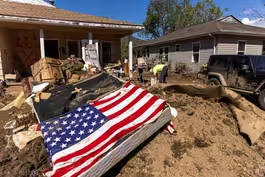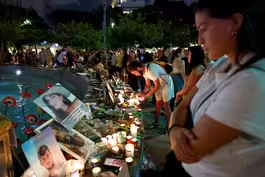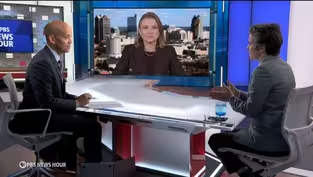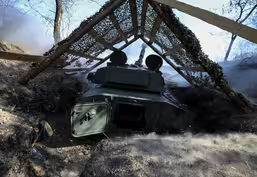
Kibbutz Be’eri frozen in horror a year after Hamas attack
Clip: 10/7/2024 | 9m 51sVideo has Closed Captions
Kibbutz Be’eri remains frozen in horror a year after Hamas attack
Among the first targets on the morning of Oct. 7 were communities across southern Israel, hit first by rockets, then infiltrated by gunmen who went house to house, killing and kidnapping civilians. One of those communities is Kibbutz Be’eri. Nick Schifrin reports on how that day has changed the region and upended the lives of its residents. A warning, images in this story are disturbing.
Problems playing video? | Closed Captioning Feedback
Problems playing video? | Closed Captioning Feedback
Major corporate funding for the PBS News Hour is provided by BDO, BNSF, Consumer Cellular, American Cruise Lines, and Raymond James. Funding for the PBS NewsHour Weekend is provided by...

Kibbutz Be’eri frozen in horror a year after Hamas attack
Clip: 10/7/2024 | 9m 51sVideo has Closed Captions
Among the first targets on the morning of Oct. 7 were communities across southern Israel, hit first by rockets, then infiltrated by gunmen who went house to house, killing and kidnapping civilians. One of those communities is Kibbutz Be’eri. Nick Schifrin reports on how that day has changed the region and upended the lives of its residents. A warning, images in this story are disturbing.
Problems playing video? | Closed Captioning Feedback
How to Watch PBS News Hour
PBS News Hour is available to stream on pbs.org and the free PBS App, available on iPhone, Apple TV, Android TV, Android smartphones, Amazon Fire TV, Amazon Fire Tablet, Roku, Samsung Smart TV, and Vizio.
Providing Support for PBS.org
Learn Moreabout PBS online sponsorshipGEOFF BENNETT: Among the first targets on the morning of October 7 were communities across Southern Israel, hit first by rockets, then infiltrated by gunmen, who went house to house, killing and kidnapping civilians.
Among those communities, Kibbutz Be'eri, where Nick Schifrin looks back on a day that has changed the country and the region and upended the lives of its 1,000 residents.
A warning: Some images in this story may be disturbing.
NICK SCHIFRIN: One year later, the Bachar home in Kibbutz Be'eri three miles from the Gaza Strip is frozen in horror, evidence of a community that will never be the same, a family that will never be whole, and a safe room that couldn't keep them safe.
AVIDA BACHAR, Kibbutz Be'eri, Israeli, Resident: They get into the house.
You hear the steps on the floor.
And they know that people still alive, they are in the safe room.
So they go straight to the safe room.
They try to open and you close, and they try to open.
And you close and they told me, "Open the door."
NICK SCHIFRIN: Avida Bachar lived here with Dana, his wife of 32 years, their son, Carmel, and daughter Hadar.
The home stands as it was 365 days ago, a clock frozen to the time of the attack on this house and a safe room where Hadar Bachar recorded these messages for a local chat group.
HADAR BACHAR, Victim (through translator): They are burning us.
We can't -- they burn us.
Come now, now, now.
We're being shot.
They shot us.
Come now.
AVIDA BACHAR: They shot me through the door.
So, I saw one bullet took my arm here in the side, and a few seconds later, I collapsed and fell out of the safe room.
Carmel, both hands go, because he holding like that, and the bullets hit his arm.
NICK SCHIFRIN: The bullet holes and his or his son's blood still stay in the door.
HADAR BACHAR (through translator): Help us please.
They threw three grenades at us, please help us We're dying here.
My whole leg is injured.
My whole leg is punctured, dad, all his legs, Carmel too.
Mom is going to die, I'm telling you.
Help us, anyone who can help us, please.
I love you.
We love you.
We all love you.
Carmel, stay with us.
Don't close your eyes.
Mom, stay with us, don't die.
AVIDA BACHAR: Dana, she told me: "I -- I can't breathe."
Hadar, she tried to clean her a little bit, and she told Hadar: "Hadar, it's done.
I don't have nothing in this world," and she died.
Carmel told me: "Dad, when you bury me, please do it with my surfboard."
A few seconds later, he got his short breath, and he died.
NICK SCHIFRIN: A few weeks later, he and Avida led the funeral, a family split in half, a country in mourning and shock, and a son's final wish granted, Carmel buried with his surfboard.
Bachar's leg was amputated, and he spent five months in the hospital.
How does your leg feel today?
AVIDA BACHAR: Good.
Practicing.
NICK SCHIFRIN: Today, he's increasingly sure of his step and of a lesson taught by tragedy.
AVIDA BACHAR: When you say thank you for something, I'm not believe in God, but I can say thank you to Dana about 32 years with me.
I met her, she was 17.
And you got your wife for 32 years.
Why you cry?
You got everything.
You got more than rich people on a boat.
You got everything.
So I can thank you for her about this time.
And I can thank you also to Carmel, about 15 years, because I got a great son.
NICK SCHIFRIN: Be'eri's 1,000 residents lived in about three square miles, invaded by more than 340 gunmen, some wearing Israeli uniforms, civilians killed point blank, dead bodies discarded or denied any dignity and taken back to Gaza, a couple embracing each other burned alive.
In total, 101 civilians, more than one-tenth of Be'eri's population and more than 30 security personnel, were killed, including a friend who fought alongside Yonatan Alfia.
YONATAN ALFIA, Former Israeli Paratrooper (through translator): The chaos was so high, none of us understood what's going on.
NICK SCHIFRIN: Alfia is a reservist and former paratrooper.
He and others came from all over to join a handful of Israeli special forces to fight back.
It took them nearly two days to declare a Be'eri liberated and bring shocked survivors out of their safe rooms.
YONATAN ALFIA (through translator): The main feeling of us fighters in this area was that we came to the battle unprepared.
I, for example, came only with my personal handgun, when the other side, Hamas terrorists, fight us with RPGs, rockets, suicide drones, automatic weapons, mortar bombs and well-prepared command.
NICK SCHIFRIN: The IDF's own investigation into actions here in Be'eri admitted that it failed the residents here, that the early response was characterized by a lack of coordination and command-and-control, and that the residents of Be'eri were largely left on their own for the first seven hours.
Be'eri's founders came here in 1946, when it was nothing but Negev Desert.
They were pioneers, hoping to help create a country and build an agricultural settlement with residents who live communally.
NILI BAR SINAI, Kibbutz Be'eri, Israel, Resident: This kibbutz, there was nothing here because there was no water.
Everything that you see here is planted.
Everything is manmade.
NICK SCHIFRIN: Nili Bar Sinai has lived here for a half-century, lured by Yoram Bar Sinai, one of the kibbutz's original architects.
They started a family and advocated for the kibbutz's founding principle, cooperation.
NILI BAR SINAI: He's cooperative and not competitive, but he wants to live together.
And it's the saddest irony of all that we think in such cooperative terms, and this is what they do to us.
NICK SCHIFRIN: You live on the opposite side of the kibbutz.
NILI BAR SINAI: Yes.
Yes.
NICK SCHIFRIN: And your husband came here on the morning of the 7th.
NILI BAR SINAI: Yes.
NICK SCHIFRIN: One year ago, Yoram Bar Sinai rushed to this house, their daughters, to help defend her and the grandkids.
NILI BAR SINAI: They stopped the car and went up, seven of them, and he shot and they shot.
And that was it.
My daughter was there with three kids and she heard the sound.
And then she heard steps coming and she hoped it was him.
But it wasn't.
Somebody opened this thing, and she slammed the door on him, and she stayed there holding the handle for 20 hours, I think.
He was a cooperative guy.
He could handle anyone, including me.
He could take me for 50 years, so you can imagine.
He was a good father.
He was like a local kibbutznik.
He was an army officer, and he was playing guitar.
He was drawing.
He was just the best you could get.
NICK SCHIFRIN: Twenty-five miles to the east, another kibbutz, Hatzerim, has opened its doors to Be'eri's displaced and built them new prefab houses, including for Ayelet Hakim.
AYELET HAKIM, Displaced Resident of Kibbutz Be'eri, Israel: What was done to us on the 7th of October is unimaginable, and I don't think anybody invented a word for it.
And my life since, it's just the same.
I have a house, but not a home.
NICK SCHIFRIN: Hakim knows how lucky she is to be here and have her family whole.
That's her sister, Raz Ben Ami, abducted to Gaza one year ago today, alongside her brother-in-law, Ohad Ben Ami, two of 30 hostages taken from Be'eri.
Raz was released during last November's cease-fire, but Ohad remains a hostage.
AYELET HAKIM: I try to tell myself, convince myself he's still alive, because we know about dead hostages.
So, if we know about the dead hostages, the other ones that we don't know about are still alive, as far as we know.
And hopefully they will do something about it and bring him back.
NICK SCHIFRIN: Back in Be'eri today, at the epicenter of their loss, residents rallied for the hostages and hoped they heard a message.
"You are not alone," they chant.
That's also a reminder for themselves.
AVIDA BACHAR: We're back to Be'eri because this is our place.
I'm born here.
I'm going to die here.
We're going to rebuild Be'eri again.
NILI BAR SINAI: My mother was killed 50 years ago at the Lod Airport, and now my husband.
And still I'm here.
So they will have to understand this.
Nobody is going because they kill us.
Nobody is going.
NICK SCHIFRIN: Determination despite devastation.
But this community and country are still traumatized.
And one year later, Be'eri and October the 7th remains an open wound.
For the "PBS News Hour," I'm Nick Schifrin in Kibbutz Be'eri, Israel.
Helene recovery complicated by lies and conspiracy theories
Video has Closed Captions
Clip: 10/7/2024 | 6m 55s | Helene recovery complicated by lies, hoaxes and conspiracy theories (6m 55s)
Israel marks one year since Hamas' Oct. 7 attack as war rages on multiple fronts
Video has Closed Captions
Clip: 10/7/2024 | 5m 26s | Israel marks year since Hamas' Oct. 7 attack as war rages (5m 26s)
Next generation of auto techs preparing for EV transition
Video has Closed Captions
Clip: 10/7/2024 | 6m 57s | How the next generation of auto techs is preparing for the electric vehicle transition (6m 57s)
Tamara Keith and Amy Walter on key voters and states
Video has Closed Captions
Clip: 10/7/2024 | 9m 30s | Tamara Keith and Amy Walter on the voters and states that will decide the election (9m 30s)
Ukrainians face painful choice as Russians advance on town
Video has Closed Captions
Clip: 10/7/2024 | 6m 55s | Ukrainians face painful choice of leaving or staying as Russian forces advance on town (6m 55s)
Providing Support for PBS.org
Learn Moreabout PBS online sponsorship
- News and Public Affairs

FRONTLINE is investigative journalism that questions, explains and changes our world.

- News and Public Affairs

Amanpour and Company features conversations with leaders and decision makers.












Support for PBS provided by:
Major corporate funding for the PBS News Hour is provided by BDO, BNSF, Consumer Cellular, American Cruise Lines, and Raymond James. Funding for the PBS NewsHour Weekend is provided by...




